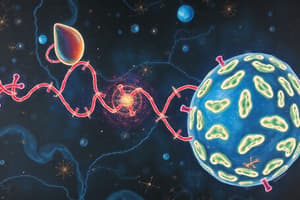Podcast
Questions and Answers
What is the main function of catabolic pathways in cells?
What is the main function of catabolic pathways in cells?
- Generate energy by breaking bonds (correct)
- Convert reactants to products with multiple steps
- Facilitate energy transfer between cells
- Require energy to build larger molecules
Which type of energy is associated with motion?
Which type of energy is associated with motion?
- Chemical energy
- Potential energy
- Kinetic energy (correct)
- Thermal energy
What does the first law of thermodynamics state?
What does the first law of thermodynamics state?
- Entropy always decreases in energy transfer
- Energy transfer is 100% efficient in living organisms
- Energy is not created nor destroyed, only transferred or transformed (correct)
- Potential energy is always greater than kinetic energy
Which type of reaction releases energy?
Which type of reaction releases energy?
What is the role of enzymes in chemical reactions?
What is the role of enzymes in chemical reactions?
In which type of pathway are larger molecules built from smaller units?
In which type of pathway are larger molecules built from smaller units?
What aspect of cells does bioenergetics primarily focus on?
What aspect of cells does bioenergetics primarily focus on?
Which factor can affect enzyme function?
Which factor can affect enzyme function?
What type of reaction consumes ATP molecules?
What type of reaction consumes ATP molecules?
What is the main function of catabolic pathways in cells?
What is the main function of catabolic pathways in cells?
Which statement best describes bioenergetics in cells?
Which statement best describes bioenergetics in cells?
What is the role of enzymes in chemical reactions?
What is the role of enzymes in chemical reactions?
Which type of energy is associated with stored energy waiting to be used?
Which type of energy is associated with stored energy waiting to be used?
What do exergonic reactions do?
What do exergonic reactions do?
How do enzymes affect reaction efficiency?
How do enzymes affect reaction efficiency?
Which factor can affect enzyme function?
Which factor can affect enzyme function?
In which type of pathway are reactants converted into products through multiple steps?
In which type of pathway are reactants converted into products through multiple steps?
Which statement best describes the second law of thermodynamics?
Which statement best describes the second law of thermodynamics?
Which type of reaction requires an input of energy to proceed?
Which type of reaction requires an input of energy to proceed?
What is the main difference between catabolic and anabolic pathways?
What is the main difference between catabolic and anabolic pathways?
Which statement accurately describes the role of ATP in cellular reactions?
Which statement accurately describes the role of ATP in cellular reactions?
What does bioenergetics primarily study in organisms?
What does bioenergetics primarily study in organisms?
Which statement accurately describes the concept of entropy in organisms?
Which statement accurately describes the concept of entropy in organisms?
What is the main objective of thermodynamics with respect to energy transfer?
What is the main objective of thermodynamics with respect to energy transfer?
Which type of cell reaction releases energy with less free energy in the products?
Which type of cell reaction releases energy with less free energy in the products?
What is the role of allosteric regulation in enzyme function?
What is the role of allosteric regulation in enzyme function?
How does cooperativity affect enzyme activity?
How does cooperativity affect enzyme activity?
What is the main function of feedback inhibition in metabolic pathways?
What is the main function of feedback inhibition in metabolic pathways?
How do cofactors, inhibitors, toxins, and poisons influence enzyme activity?
How do cofactors, inhibitors, toxins, and poisons influence enzyme activity?
Why is regulation of enzyme activity crucial within cells?
Why is regulation of enzyme activity crucial within cells?
Study Notes
- Cells are chemical factories where various reactions take place to obtain energy and materials for daily functions.
- Metabolism encompasses all chemical reactions in an organism, an emergent property.
- Metabolic pathways involve reactants converted to products with multiple steps catalyzed by specific enzymes.
- Catabolic pathways generate energy by breaking bonds, while anabolic pathways require energy to build larger molecules.
- Bioenergetics deals with managing energy resources in cells, as they don't have unlimited energy.
- Energy is the ability to cause change, with various forms like potential, kinetic, and chemical.
- Thermodynamics studies energy transfer in systems, with the first law conserving energy and the second law increasing entropy.
- Organisms can have both potential and kinetic energy, converting between the two.
- Cells have both exergonic and endergonic reactions, with free energy change determining spontaneity.
- Exergonic reactions release energy, while endergonic reactions require energy input.
- ATP molecules are consumed in endergonic reactions and reformed in exergonic reactions, facilitating energy transfer.
- Enzymes reduce activation energy to speed up reactions and help form intermediates and products efficiently.
- Enzymes bind to substrates in active sites, adjusting shape to optimize reaction efficiency.
- Different factors like substrate concentration, temperature, and pH affect enzyme function.
- Inhibitors block enzyme activity, with competitive inhibitors binding to active sites and non-competitive inhibitors altering enzyme shape.
- Allosteric regulation allows enzymes to be regulated by binding to specific sites, influencing activity.
- Cooperativity enhances enzyme activity, allowing multiple substrate molecules to bind and increase efficiency.
- Feedback inhibition uses the product of a metabolic pathway to shut down that pathway when sufficient product is present.
Studying That Suits You
Use AI to generate personalized quizzes and flashcards to suit your learning preferences.
Description
Explore the fundamentals of cellular metabolism, including metabolic pathways, energy transfer, and enzyme functions. Learn about the different types of pathways, energy conversions, enzymatic reactions, and factors influencing enzyme activity.




